
Journal of Coatings Technology and Research
Scope & Guideline
Elevating Coatings Research for a Sustainable Tomorrow
Introduction
Aims and Scopes
- Coating Materials and Formulations:
The journal publishes research on a variety of coating materials, including polymers, ceramics, and composites. It highlights advancements in formulations that enhance performance characteristics such as durability, adhesion, and environmental resistance. - Surface Engineering and Modification:
Research on techniques for modifying surfaces to improve their properties is a core focus. This includes studies on superhydrophobic surfaces, self-cleaning coatings, and anti-fouling technologies. - Corrosion Protection:
A significant area of research is dedicated to coatings designed for corrosion resistance. This includes the development of novel materials and systems that provide long-lasting protection for metals and other substrates. - Thermal and Fire Resistance:
The journal explores coatings with enhanced thermal stability and fire-retardant properties, addressing safety in various applications, particularly in construction and transportation. - Sustainability and Eco-Friendly Coatings:
There is a growing emphasis on sustainable practices within the coatings industry, including the development of bio-based and low-VOC coatings, as well as research on recycling and eco-friendliness. - Smart and Functional Coatings:
The journal also covers emerging technologies in smart coatings that respond to environmental stimuli, such as temperature or humidity, and multifunctional coatings that combine several desirable properties. - Nanotechnology in Coatings:
Nanotechnology is increasingly utilized in coatings to enhance properties such as strength, flexibility, and barrier performance. The journal publishes significant findings related to the incorporation of nanoparticles into coatings.
Trending and Emerging
- Eco-Friendly and Sustainable Coatings:
There is a notable increase in research focused on developing eco-friendly coatings, including bio-based materials and low-VOC formulations, in response to environmental regulations and consumer demand. - Self-Healing Coatings:
Self-healing coatings are gaining traction for their ability to repair damage autonomously, enhancing the longevity and durability of coated surfaces. This is particularly relevant in high-performance applications. - Smart Coatings with Functional Properties:
Research into smart coatings that respond to environmental stimuli, such as temperature or moisture, is on the rise. These coatings offer potential applications in various fields, including construction and consumer goods. - Nanostructured and Nanocomposite Coatings:
The use of nanotechnology in coatings is increasingly prevalent, with studies focusing on the incorporation of nanoparticles to enhance mechanical, thermal, and protective properties. - Antimicrobial and Antifouling Coatings:
The demand for coatings with antimicrobial properties is growing, particularly in healthcare and marine applications, to prevent biofilm formation and enhance hygiene. - Advanced Characterization Techniques:
Emerging methods for characterizing coating properties, including advanced imaging and testing techniques, are becoming more common, enabling deeper insights into coating performance and behavior.
Declining or Waning
- Traditional Solvent-Based Coatings:
Research on conventional solvent-based coatings is declining as industries move towards more environmentally friendly alternatives. The focus is shifting to waterborne and UV-curable formulations. - Simple Aesthetic Coatings:
There is a reduced emphasis on coatings whose primary function is aesthetic. The trend is moving towards multifunctional coatings that provide additional benefits such as anti-corrosion and self-cleaning properties. - Single-Function Coatings:
The traditional approach of developing coatings for a single function is waning. The current trend favors multifunctional coatings that can address multiple challenges simultaneously. - Non-Bio-Based Materials:
The interest in non-bio-based materials for coatings is decreasing as there is a stronger push for sustainability and the use of renewable resources in coating formulations. - Research on Coatings for Niche Applications:
Studies focused on very niche applications (e.g., coatings for specific, less common industries) are less frequent, with broader applicability and general industry relevance being prioritized.
Similar Journals

JOURNAL OF IRON AND STEEL RESEARCH INTERNATIONAL
Uncovering Breakthroughs in Metals and AlloysJOURNAL OF IRON AND STEEL RESEARCH INTERNATIONAL, published by Springer, stands as a leading peer-reviewed journal in the fields of Materials Chemistry, Mechanics of Materials, and Metals and Alloys. With a strong focus on interdisciplinary research, the journal contributes significantly to the advancement of knowledge in these sectors, reflected in its impressive ranking, including Q1 status in Metals and Alloys for 2023. The journal is not only a crucial resource for critical insights into the properties and applications of iron and steel but also serves as a vibrant platform for researchers and professionals to disseminate novel findings ranging from fundamental science to practical engineering applications. With a broad scope that has evolved since its inception in 1996 and maintains a consistent commitment to high-quality research, this journal is essential for students, scholars, and industry experts aiming to keep abreast of the latest developments and innovations in the iron and steel domain.

Corrosion Science and Technology-Korea
Advancing corrosion knowledge for a sustainable future.Corrosion Science and Technology-Korea, published by the CORROSION SCIENCE SOC KOREA, is a pivotal journal dedicated to the exploration and advancement of knowledge in corrosion science, particularly within the context of materials performance and maintenance. Established to foster innovation and collaboration among scholars in South Korea and beyond, this journal focuses on areas such as electrochemistry, metal alloys, and surface coatings, catering to a diverse audience of researchers, professionals, and students in materials science and chemistry. Despite its current quartile rankings, including Q4 in Electrochemistry and Q3 in various materials-related categories, the journal aims to enhance its visibility and impact in the scientific community by publishing high-quality research and reviews. With its ISSN 1598-6462 and E-ISSN 2288-6524, Corrosion Science and Technology-Korea is committed to contributing to the understanding and mitigation of corrosion issues, thereby promoting sustainability and longevity in engineering applications.

Protection of Metals and Physical Chemistry of Surfaces
Innovative Insights into Materials and CoatingsProtection of Metals and Physical Chemistry of Surfaces is a prominent academic journal published by MAIK NAUKA/INTERPERIODICA/SPRINGER, which provides a specialized platform for researchers and professionals in the fields of materials chemistry, metals and alloys, organic chemistry, as well as surfaces, coatings, and films. With an ISSN of 2070-2051 and an E-ISSN of 2070-206X, the journal is recognized for its rigorous peer-reviewed content and comprehensive coverage of innovative research addressing the latest advancements in material protection and surface chemistry. As of 2023, the journal has been categorized in the Q3 quartile across several relevant fields, highlighting its increasing influence within the scientific community. Although the journal is relatively niche, its open access model encourages wide dissemination of knowledge, fostering collaboration and advancements within its core disciplines. Research published in this journal plays a crucial role in not only enhancing theoretical understanding but also facilitating practical applications in various industries, thereby underlining its importance for students, researchers, and professionals alike.
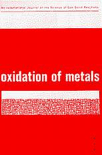
OXIDATION OF METALS
Charting New Paths in Oxidation and Alloy StudiesOXIDATION OF METALS, published by SPRINGER/PLENUM PUBLISHERS, stands as a pivotal journal in the fields of Inorganic Chemistry, Materials Chemistry, and Metals and Alloys. Established in 1969, it has consistently contributed to advancing knowledge and research on the oxidation processes in metals, essential for various industrial applications and theoretical frameworks. With an impact factor that reflects its respected position—ranked Q2 in key scientific categories—this journal facilitates cutting-edge discourse among researchers and practitioners alike. The journal is committed to open access, ensuring that groundbreaking research on metals’ behavior and resistance to oxidation is available to a broader audience, enhancing collaboration and innovation. Spanning over five decades, OXIDATION OF METALS continues to be a crucial resource for scholars and professionals aiming to stay at the forefront of materials science and engineering.
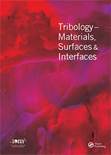
Tribology-Materials Surfaces & Interfaces
Advancing tribological knowledge for a sustainable future.Tribology-Materials Surfaces & Interfaces is a leading journal dedicated to advancing the field of tribology, leveraging insights into materials, surfaces, and interface interactions. Published by SAGE Publications Inc in the United Kingdom, this journal plays a pivotal role in disseminating high-quality research, providing a platform for both foundational and applied studies in mechanical engineering and materials science. With an impact factor reflecting its significance, ranking in the third quartile for both Materials Science and Mechanical Engineering, it caters to a diverse audience including researchers, industry professionals, and students. Although it currently does not offer open access, the journal endeavors to periodically review and publish innovative studies that enhance understanding of tribological phenomena, thereby contributing to the development of advanced materials and engineering solutions. Since its inception in 2007, Tribology-Materials Surfaces & Interfaces has consistently presented cutting-edge findings, thereby cementing its position as an essential resource for anyone engaging in tribological research.
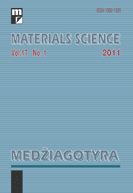
Materials Science-Medziagotyra
Pioneering Research for a Better TomorrowMaterials Science-Medziagotyra is a prominent peer-reviewed journal dedicated to the field of materials science, published by Kaunas University of Technology in Lithuania. Since its transition to an Open Access model in 2012, it has facilitated broad dissemination of research findings, enhancing accessibility for researchers and professionals worldwide. This journal is indexed in Scopus and has consistently contributed to the academic community with a focus on innovative materials and their applications, ranking in the Q3 category of Materials Science (miscellaneous) as of 2023. With the responsibility of synthesizing substantial research from 2008 through 2024, Materials Science-Medziagotyra aims to bridge gaps in material research while fostering collaboration among scientists, students, and industry leaders. Its commitment to quality and rigor in scientific discourse underscores its relevance and importance in advancing the field.
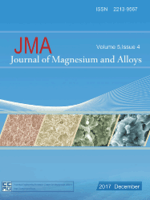
Journal of Magnesium and Alloys
Leading the Charge in Alloy AdvancementsThe Journal of Magnesium and Alloys is a prestigious, peer-reviewed academic publication dedicated to advancing the field of materials science, particularly focusing on magnesium and its alloys. Published by KEAI PUBLISHING LTD since 2013, this Open Access journal enables unrestricted dissemination of research findings, enhancing global collaboration among researchers, professionals, and students. With an ISSN of 2213-9567 and a significant impact factor, it has established itself in the upper quartiles (Q1) of both the Mechanics of Materials and Metals and Alloys categories, ranking #3 out of 176 and #9 out of 398 respectively according to Scopus. The journal aims to provide a forum for the latest advances in the understanding, production, and application of magnesium alloys, fostering innovation and sustainable practices within the materials engineering community. Based in Beijing, China, the journal is committed to bridging gaps in current knowledge and driving future research directions through its high-quality publications.

SURFACE COATINGS INTERNATIONAL
Exploring the Future of Surface CoatingsSURFACE COATINGS INTERNATIONAL is a prominent journal dedicated to the field of surface coatings, providing a critical platform for researchers, professionals, and students involved in this ever-evolving discipline. Published by the Oil & Colour Chemists Association, this journal disseminates high-quality, peer-reviewed articles that explore innovative advancements, applications, and methodologies related to coating technologies. With a focus on both theoretical and practical aspects, the journal aims to bridge the gap between research and real-world applications, promoting excellence in the development and performance of surface coatings across various industries. Although it does not currently operate on an open access model, the significance of its contributions to the field, coupled with its commitment to fostering scientific discussion, positions SURFACE COATINGS INTERNATIONAL as an essential resource for those seeking to enhance their knowledge and innovate within this specialized area.

Surfaces is an esteemed academic journal published by MDPI in Switzerland, operating as an open access platform since 2018. With an E-ISSN of 2571-9637, this journal focuses on the interdisciplinary advancements in the fields of chemistry, materials science, and physics, particularly in the domain of surfaces and interfaces. As a testament to its scholarly impact, Surfaces is ranked in the second quartile for multiple categories as of 2023, including Chemistry (miscellaneous), Materials Science (miscellaneous), Surfaces and Interfaces, as well as Surfaces, Coatings and Films, showcasing its relevance within these disciplines. Researchers and professionals seeking to disseminate and acquire knowledge on the latest innovations can benefit from the journal's rigorous peer-review process and commitment to quality, ensuring visibility and accessibility for current developments in surface technology and material interactions. With a growing archive from 2019 to 2024, Surfaces stands out as a vital resource for the academic community.
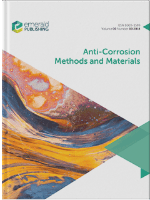
ANTI-CORROSION METHODS AND MATERIALS
Advancing Knowledge in Anti-Corrosion StrategiesANTI-CORROSION METHODS AND MATERIALS, published by EMERALD GROUP PUBLISHING LTD, is a leading journal in the fields of chemical engineering and materials science, focusing on innovative methods and materials for corrosion prevention and control. With its ISSN 0003-5599 and E-ISSN 1758-4221, this esteemed journal has been contributing to the academic community since its inception in 1954 and continues to be relevant through 2024. Despite its Q3 ranking in both Chemical Engineering and Materials Science categories, the journal plays a critical role in disseminating valuable insights and advancements, catering to a diverse audience of researchers, professionals, and students. Although the journal does not offer open access options, it remains a significant resource for those seeking to enhance their understanding of corrosion methodologies and to implement best practices in various industrial applications. With the recent Scopus rankings reflecting its impact, ANTI-CORROSION METHODS AND MATERIALS stands as a pivotal element of scholarly discourse in mitigating corrosion challenges in modern materials.